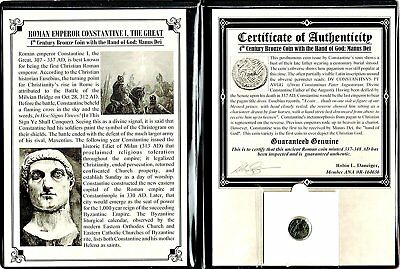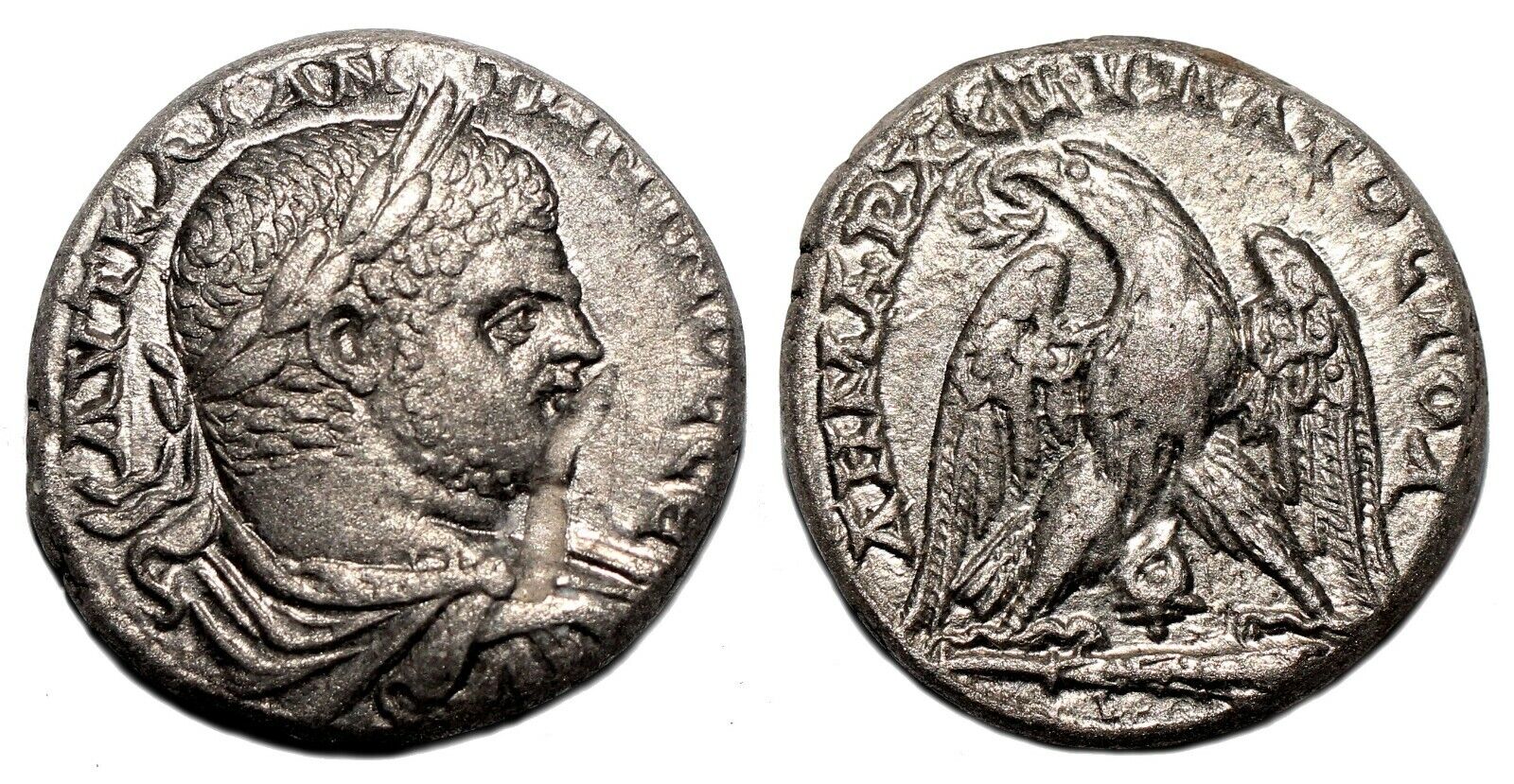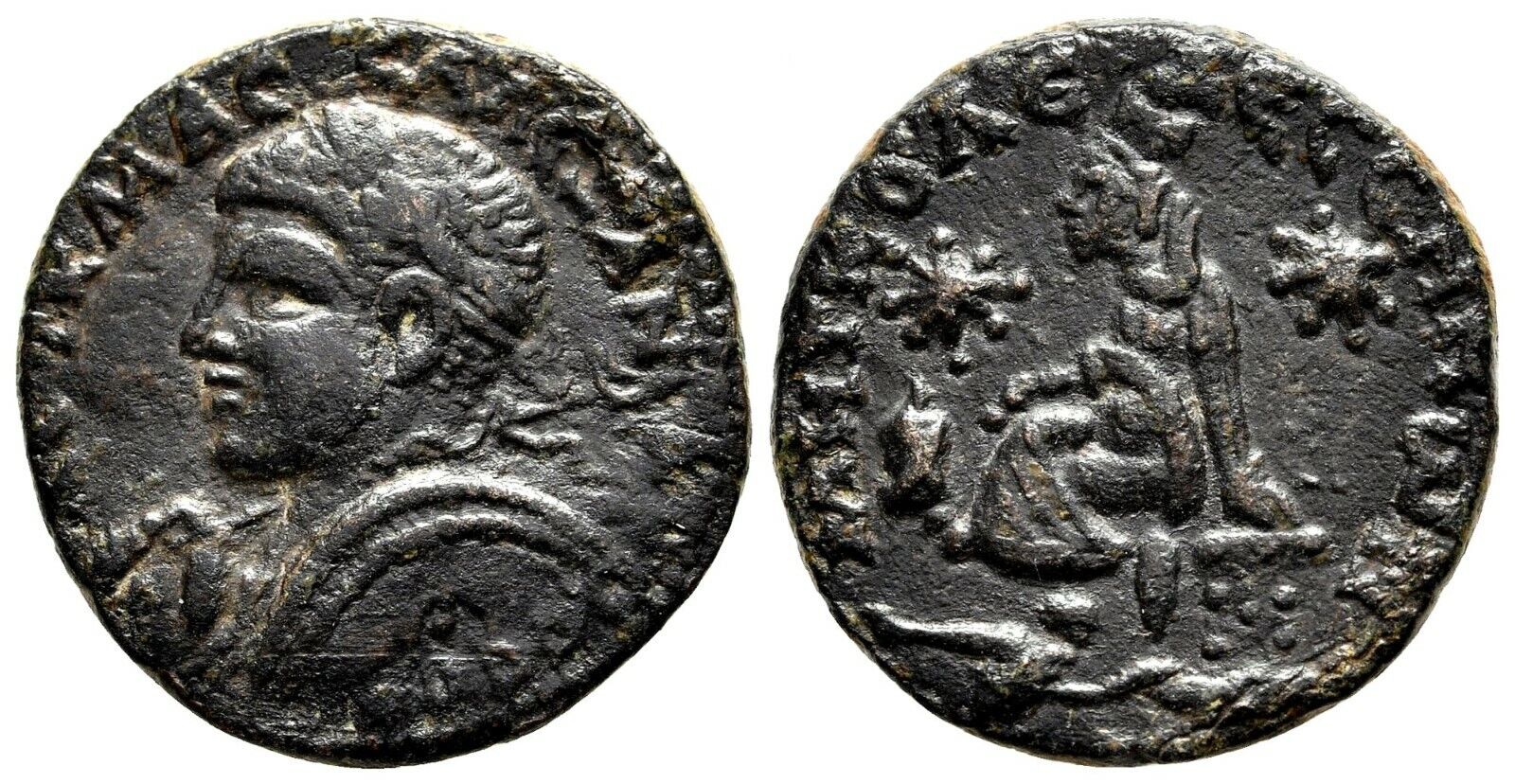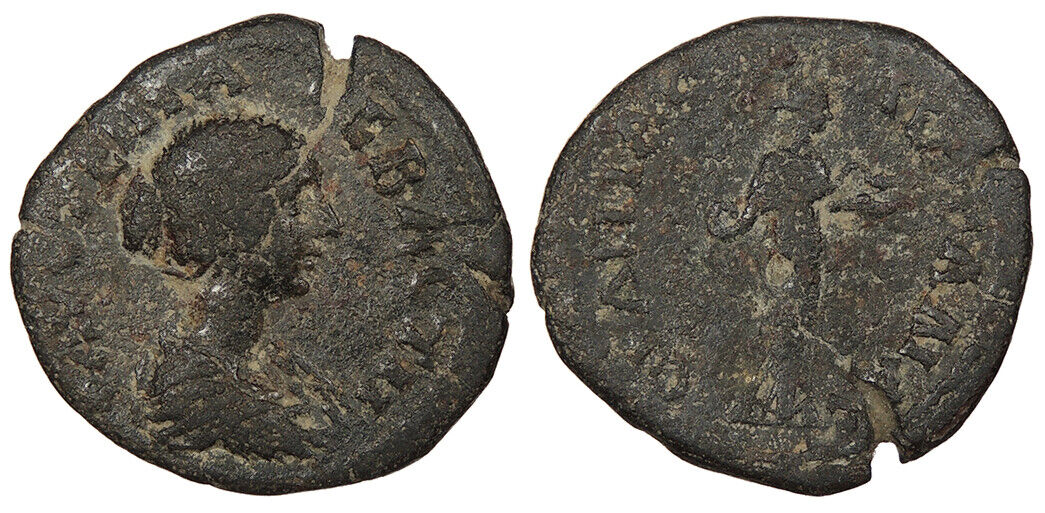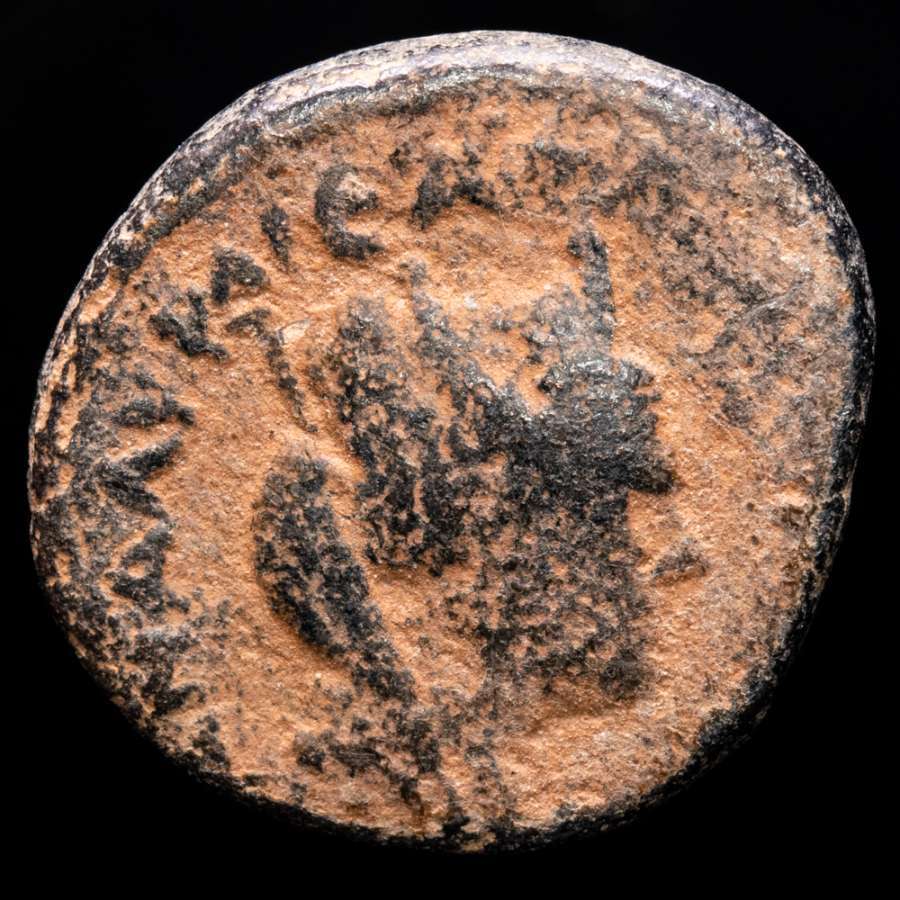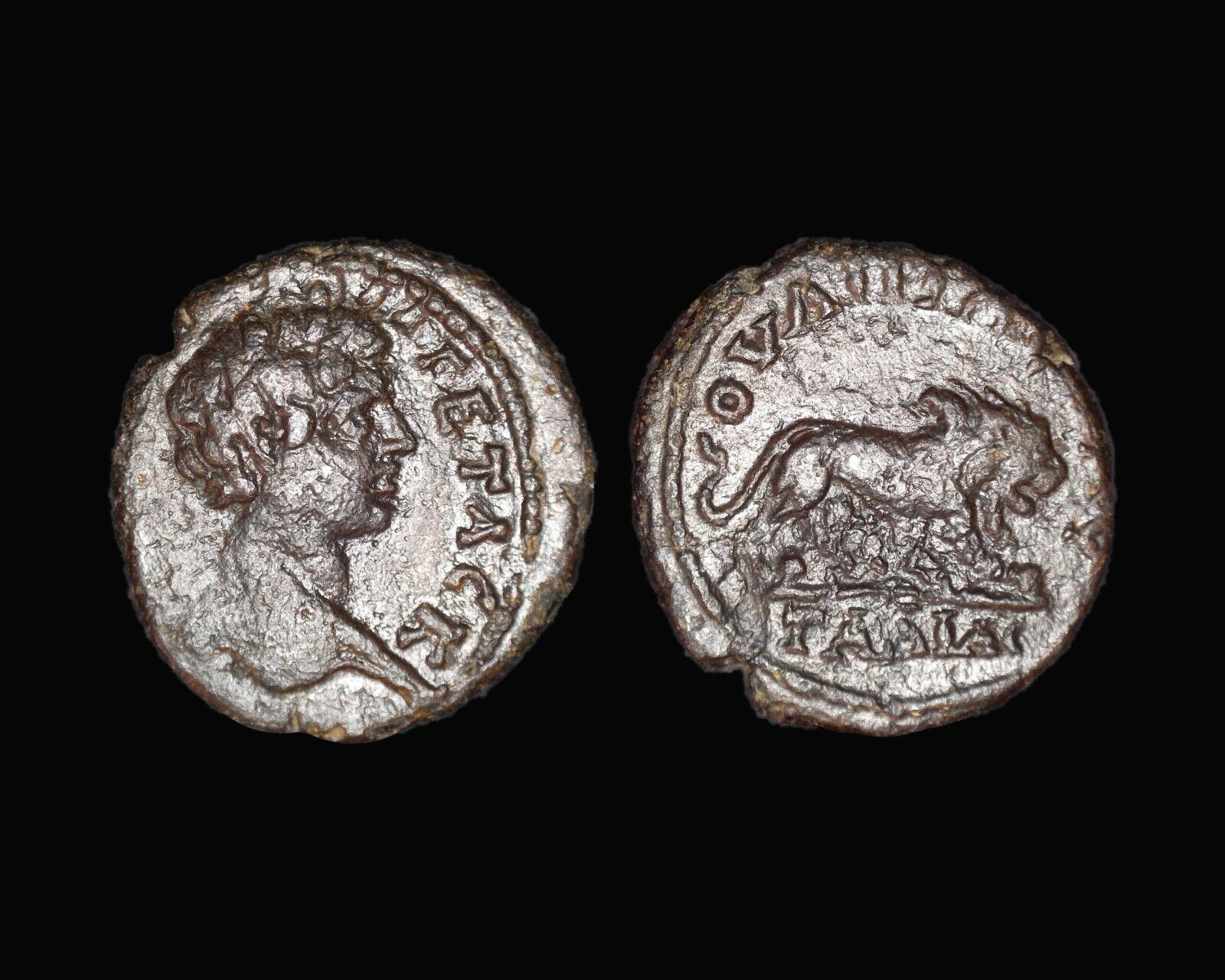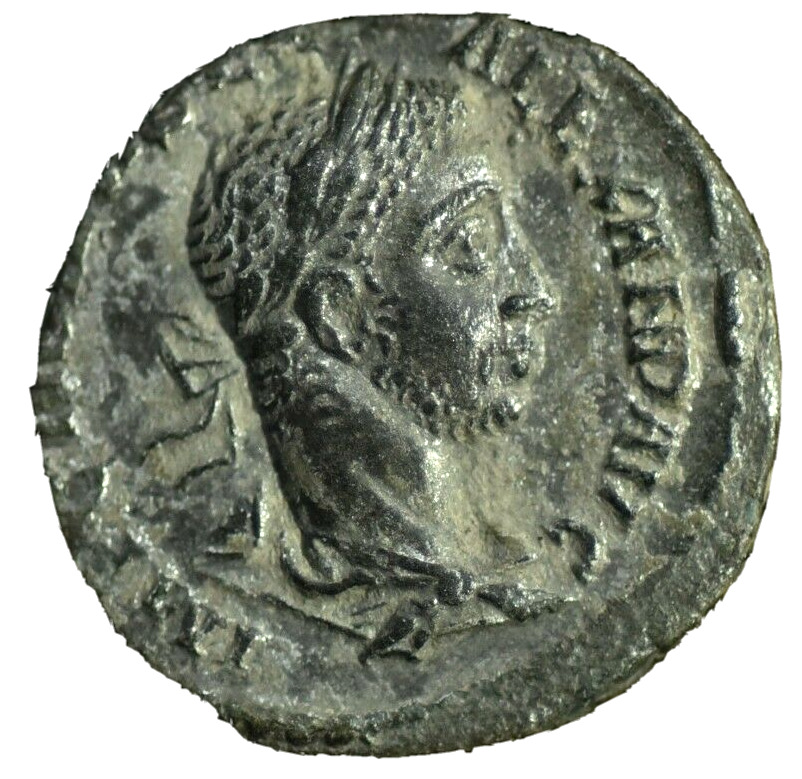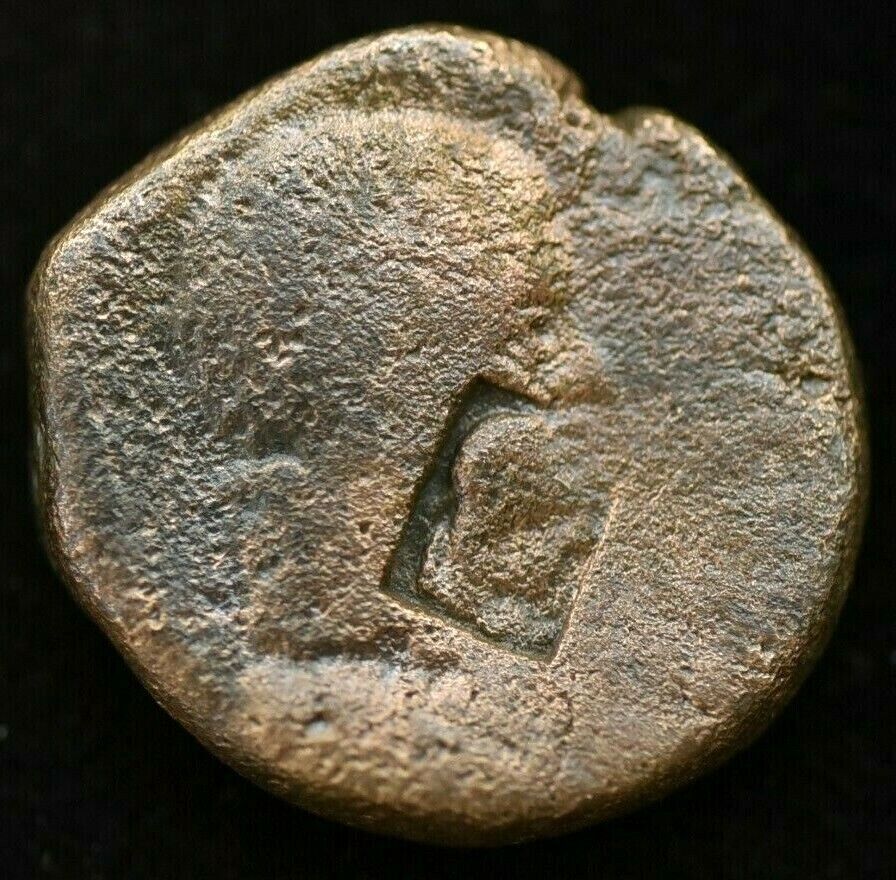-40%
VALERIUS GRATUS 17AD Judaea Province JERUSALEM Livia Tiberius Roman Coin i42830
$ 158.4
- Description
- Size Guide
Description
Item:i42830
Authentic Ancient Coin of:
Valerius Gratus
Prefect / Governor of Judaea
under
Roman Emperor
Tiberius
15-26 A.D. or possibly 15-18 A.D.
Bronze Prutah 17mm (1.93 grams)
Jerusalem
mint, circa 15-26 A.D.
Reference: Hendin 1336
IOY
ΛΙΑ (Julia) above vine leaf and small bunch of grapes.
LΔ (year 4 = 17/18 A.D.) flanks narrow-necked amphora with scroll handles.
* Numismatic Note: Julia is Julia Augusta, otherwise known as Livia, the mother of emperor Tiberius.
After banishing Herod Archealaus in 6 A.D., Rome wound up creating the governors for the province of Judaea until about 66 A.D. The governors usually came from the Roman class of Knights, whom held fewer privilages than the senate class. The governors overall had the power to levy the taxes on behalf of Rome and enrich themselves doing so. This wound up sowing the seeds of resentment among the Jewish community and leading up to the Jewish Roman War. The coins of the governors (called prefects until time of Claudius and procurators from then on) had struck coins with the names of the emperors and their families. The governors held lived in Caesarea Maritima and usually came to Jerusalem only in times of great festivals when a lot of pilgrims would arrive there.
You are bidding on the exact item pictured, provided with a Certificate of Authenticity and Lifetime Guarantee of Authenticity.
Valerius Gratus
was the Roman
Prefect
of
Iudaea province
under
Tiberius
from 15 to 26 AD. He succeeded
Annius Rufus
and was replaced by
Pontius Pilate
.
The government of Gratus is chiefly remarkable for the frequent changes he made in the appointment of the
high-priesthood
. He deposed
Ananus
, and substituted
Ismael, son of Fabi
, then Eleazar, son of Arianus, then Simon, son of Camith, and lastly
Joseph Caiaphas
, the son-in-law of Ananus.
In popular culture
In the book
Ben-Hur: A Tale of the Christ
and its derived films, Gratus is almost killed by a tile which is accidentally dropped by Judah Ben-Hur, which prompts all subsequent events of the story. In the novel Gratus is portrayed as a corrupt governor who acted against the Jews by removing the rightful head priest of the Temple, Hannas, and replacing him with a Roman puppet, Ishmael.
Livia Drusilla
, (
Classical Latin
:
LIVIA•DRVSILLA
,
LIVIA•AVGVSTA
) (58 BC–AD 29), after her formal adoption into the Julian family in AD 14 also known as
Julia Augusta
, was a Roman empress as the third wife of the
Emperor
Augustus
and his advisor. She was the mother of the Emperor
Tiberius
, paternal grandmother of the Emperor
Claudius
, paternal great-grandmother of the Emperor
Caligula
, and maternal great-great grandmother of the Emperor
Nero
. She was
deified
by Claudius who acknowledged her title of
Augusta
.
Birth and first marriage to Tiberius Claudius Nero
She was born on 30 January 59 or 58 BC as the daughter of
Marcus Livius Drusus Claudianus
by his wife
Aufidia
, a daughter of the magistrate Marcus
Aufidius Lurco
. The diminutive
Drusilla
often found in her name suggests that she was a second daughter.
Marcus Livius Drusus
was her brother. She was probably married in 43 BC. Her first child, the future Emperor Tiberius, was born in 42 BC. Her father married her to
Tiberius Claudius Nero
, her cousin of
patrician
status who was fighting with him on the side of
Julius Caesar
's assassins against Octavian. Her father committed suicide in the
Battle of Philippi
, along with
Gaius Cassius Longinus
and
Marcus Junius Brutus
, but her husband continued fighting against Octavian, now on behalf of
Mark Antony
and
his brother
. In 40 BC, the family was forced to flee Italy in order to avoid Octavian's
proscriptions
and joined with
Sextus Pompeius
in
Sicily
, later moving on to
Greece
.
Wife of Augustus
A general amnesty was announced, and Livia returned to Rome, where she was personally introduced to Octavian in 39 BC. At this time, Livia already had a son, the future emperor
Tiberius
, and was pregnant with the second,
Nero Claudius Drusus
(also known as Drusus the Elder). Legend said that Octavian fell immediately in love with her, despite the fact that he was still married to
Scribonia
. Octavian divorced Scribonia in 39 BC, on the very day that she gave birth to his daughter
Julia the Elder
(
Cassius Dio
). Seemingly around that time, when Livia was six months pregnant, Tiberius Claudius Nero was persuaded or forced by Octavian to divorce Livia. On 14 January, the child was born. Octavian and Livia married on January 17, waiving the traditional waiting period. Tiberius Claudius Nero was present at the wedding, giving her in marriage "just as a father would." The importance of the patrician Claudii to Octavian's cause, and the political survival of the Claudii Nerones are probably more rational explanations for the tempestuous union. Nevertheless, Livia and Octavian remained married for the next 51 years, despite the fact that they had no children apart from a single miscarriage. She always enjoyed the status of privileged counselor to her husband, petitioning him on the behalf of others and influencing his policies, an unusual role for a Roman wife in a culture dominated by the
paterfamilias
.
After
Mark Antony
's suicide following the
Battle of Actium
in 31 BC, Octavian had removed all obstacles to his power and henceforth ruled as
Emperor
, from 27 BC on, under the honorary title
Augustus
. He and Livia formed the role model for Roman households. Despite their wealth and power, Augustus's family continued to live modestly in their house on the
Palatine Hill
. Livia would set the pattern for the noble Roman
matrona
. She wore neither excessive jewelry nor pretentious costumes, she took care of the household and her husband (often making his clothes herself), always faithful and dedicated. In 35 BC Octavian gave Livia the unprecedented honour of ruling her own finances and dedicated a public statue to her. She had her own circle of clients and pushed many protégés into political offices, including the grandfathers of the later emperors
Galba
and
Otho
.
With Augustus being the father of only one daughter (
Julia the Elder
by Scribonia), Livia revealed herself to be an ambitious mother and soon started to push her own sons
Tiberius
and
Nero Claudius Drusus
into power. Drusus was a trusted general and married Augustus's favourite niece,
Antonia Minor
, and had three children: the popular general
Germanicus
,
Livilla
, and the Emperor
Claudius
. Tiberius married Augustus' daughter
Julia the Elder
in 11 BC and was ultimately adopted by his stepfather in 4 BC and named as Augustus' heir.
Rumor had it that when
Marcellus
, nephew of Augustus, died in 23 BC, it was no natural death, and that Livia was behind it.
[9]
After the two elder sons of Julia by
Marcus Vipsanius Agrippa
, whom Augustus had adopted as sons and successors, had died, the one remaining son
Agrippa Postumus
was incarcerated and finally killed.
Tacitus
charges that Livia was not altogether innocent of these deaths and
Cassius Dio
also mentions such rumours, but not even the gossipmonger
Suetonius
, who had access to official documents, repeats them. Most modern historical accounts of Livia's life discount the idea. There are also rumors mentioned by Tacitus and Cassius Dio that Livia brought about Augustus' death by poisoning fresh figs. Augustus' granddaughter was
Julia the Younger
. Sometime between 1 and 14, her husband Paullus was executed as a conspirator in a revolt. Modern historians theorize that Julia's exile was not actually for adultery but for involvement in Paulus' revolt. Livia Drusilla plotted against her stepdaughter's family and ruined them. This led to open compassion for the fallen family. Julia died in 29 AD on the same island where she had been sent in exile twenty years earlier.
Life after Augustus, Death, and Aftermath
Augustus died in AD 14, being
deified
by the senate shortly afterwards. In his will, he left one third of his property to Livia, and the other two thirds to
Tiberius
. In the will, he also adopted her into the
Julian family
and granted her the
honorific title of Augusta
. These dispositions permitted Livia to maintain her status and power after his death, under the new name of
Julia Augusta
.
For some time, Livia and her son Tiberius, the new Emperor, appeared to get along with each other. Speaking against her became treason in AD 20, and in AD 24 he granted his mother a theatre seat among the
Vestal Virgins
. Livia exercised unofficial but very real power in Rome. Eventually, Tiberius became resentful of his mother's political status, particularly against the idea that it was she who had given him the throne. At the beginning of the reign he vetoed the unprecedented title
Mater Patriae
("Mother of the Fatherland") that the Senate wanted to bestow upon her, in the same manner in which Augustus had been named
Pater Patriae
("Father of the Fatherland"). (Tiberius also consistently refused the title of
Pater Patriae
for himself.)
The historians Tacitus and Cassius Dio depict an overweening, even domineering dowager, ready to interfere in Tiberius’ decisions, the most notable instances being the case of
Urgulania
(grandmother of Claudius's first wife
Plautia Urgulanilla
), a woman who correctly assumed that her friendship with the empress placed her above the law, and
Munatia Plancina
, suspected of murdering
Germanicus
and saved at Livia’s entreaty. (Plancina committed suicide in 33 AD after being accused again of murder after Livia's death). A notice from AD 22 records that Julia Augusta (Livia) dedicated a statue to Augustus in the centre of Rome, placing her own name even before that of Tiberius.
Ancient historians give as a reason for Tiberius’ retirement to
Capri
his inability to endure her any longer. Until AD 22 there had, according to Tacitus, been "a genuine
harmony
between mother and son, or a hatred well concealed;" Dio tells us that at the time of his accession already Tiberius heartily loathed her. In
AD 22
she had fallen ill, and Tiberius had hastened back to Rome in order to be with her. But in AD 29 when she finally fell ill and died, he remained on Capri, pleading pressure of work and sending
Caligula
to deliver the funeral oration. Suetonius adds the macabre detail that "when she died... after a delay of several days, during which he held out hope of his coming, [she was at last] buried because the condition of the corpse made it necessary...". Divine honours he also vetoed, stating that this was in accord with her own instructions. Later he vetoed all the honours the Senate had granted her after her death and canceled the fulfillment of her will.
It was not until 13 years later, in AD 42 during the reign of her grandson
Claudius
, that all her honours were restored and her deification finally completed. She was named
Diva Augusta
(
The Divine Augusta
), and an elephant-drawn chariot conveyed her image to all public games. A statue of her was set up in the temple of Augustus along with her husband's, races were held in her honour, and women were to invoke her name in their sacred oaths. In 410 AD during the
Sack of Rome (410)
her ashes were scattered when Augustus' tomb was sacked.
Her
Villa ad Gallinas Albas
north of Rome is currently being excavated; its famous frescoes of imaginary garden views may be seen at
National Museum of Rome
. One of the most famous statues of Augustus (the
Augustus of Prima Porta
) came from the grounds of the villa.
Livia's personality
While reporting various unsavoury hearsay, the ancient sources generally portray Livia (Julia Augusta) as a woman of proud and queenly attributes, faithful to her imperial husband, for whom she was a worthy consort, forever poised and dignified. With consummate skill she acted out the roles of consort, mother, widow and dowager. Dio records two of her utterances: "Once, when some naked men met her and were to be put to death in consequence, she saved their lives by saying that to a chaste woman such men are in no way different from statues. When someone asked her how she had obtained such a commanding influence over Augustus, she answered that it was by being scrupulously chaste herself, doing gladly whatever pleased him, not meddling with any of his affairs, and, in particular, by pretending neither to hear nor to notice the favourites of his passion."
With time, however, and widowhood, a haughtiness and an overt craving for power and the outward trappings of status came increasingly to the fore. Livia had always been a principal beneficiary of the climate of adulation that Augustus had done so much to create, and which Tiberius despised ("a strong contempt for honours", Tacitus, Annals 4.37). In AD 24, typically, whenever she attended the theatre, a seat among the Vestals was reserved for her (Annals 4.16), and this may have been intended more as an honour for the Vestals than for her (cf. Ovid, Tristia, 4.2.13f, Epist.Ex Ponto 4.13.29f).
Livia played a vital role in the formation of her children Tiberius and Drusus. Attention focuses on her part in the divorce of her first husband, father of Tiberius, in 39/38 BC. It would be interesting to know her role in this, as well as in Tiberius’ divorce of
Vipsania Agrippina
in 12 BC at Augustus' insistence: whether it was merely neutral or passive, or whether she actively colluded in Caesar’s wishes. The first divorce left Tiberius a fosterchild at the house of Octavian; the second left Tiberius with a lasting emotional scar, since he had been forced to abandon the woman he loved for dynastic considerations.
Judea
(
Hebrew
: יהודה,
Standard
Yehuda
Tiberian
Yehûḏāh
;
Arabic
:
يهودا
;
Greek
:
Ἰουδαία
;
Latin
:
IVDAEA
), sometimes spelled in its original Latin forms of
Judæa
,
Judaea
or
Iudaea
to distinguish it from
Judea
proper, is a term used by historians to refer to the
Roman province
that incorporated the geographical regions of
Judea
,
Samaria
, and
Idumea
, and which extended over parts of the former regions of the
Hasmonean
and
Herodian
kingdoms of Israel. It was named after
Herod Archelaus
's
Tetrarchy of Judea
, of which it was an expansion, the latter name deriving from the
Kingdom of Judah
of the 6th century BCE.
Rome's involvement in the area dated from 63 BCE, following the end of the
Third Mithridatic War
, when Rome made
Syria
a province. In that year, after the defeat of
Mithridates VI of Pontus
, the
proconsul
Pompeius Magnus (
Pompey the Great
)
sacked Jerusalem
and entered the
Jerusalem Temple
. Subsequently, during the 1st century BCE, the
Herodian Kingdom
was established as a Roman
client kingdom
and then in 6 CE parts became a
province
of the
Roman Empire
Judea province was the scene of unrest at its founding during the
Census of Quirinius
and several wars were fought in its history, known as the
Jewish-Roman wars
.
The Temple was destroyed in 70
as part of the
Great Jewish Revolt
resulting in the institution of the
Fiscus Judaicus
, and after
Bar Kokhba's revolt
(132–135 CE), the Roman Emperor
Hadrian
changed the name of the province to
Syria Palaestina
and
Jerusalem
to
Aelia Capitolina
, which certain scholars conclude was done in an attempt to remove the relationship of the Jewish people to the region.
Relations with Hasmonean and Herodian dynasties
Pompey in the Temple of Jerusalemm
, by
Jean Fouquet
The first intervention of Rome in the region dates from 63 BCE, following the end of the
Third Mithridatic War
, when Rome made a province of
Syria
. After the defeat of
Mithridates VI of Pontus
,
Pompey
(Pompey the Great) remained there to secure the area.
The region at the time was not a peaceful place. The Queen of Judaea
Salome Alexandra
had recently died and her sons,
Hyrcanus II
and
Aristobulus II
, divided against each other in a civil war.
In 63 BCE, Aristobulus was besieged in
Jerusalem
by his brother's armies. He sent an envoy to
Marcus Aemilius Scaurus
, Pompey's representative in the area. Aristobulus offered a massive bribe to be rescued, which Pompey promptly accepted. Afterwards, Aristobulus accused Scaurus of extortion. Since Scaurus was Pompey's brother in law and protégée, the general retaliated by putting Hyrcanus in charge of the kingdom as
Ethnarch
and
High Priest
, but he was denied the title of King.
When Pompey was defeated by
Julius Caesar
, Hyrcanus was succeeded by his
courtier
Antipater the Idumaean
, also known as Antipas, as the first
Roman Procurator
. In 57–55 BCE,
Aulus Gabinius
, proconsul of
Syria
, split the former
Hasmonean
Kingdom of Israel into five districts of the
Sanhedrin
.
Both Caesar and Antipater were killed in 44 BCE, and the
Idumean
Herod the Great
, Antipater's son, was designated "
King of the Jews
" by the
Roman Senate
in 40 BCE. He didn't gain military control until 37 BCE. During his reign the last representatives of the
Maccabees
were eliminated, and the great port of
Caesarea Maritima
was built. He died in 4 BCE, and his kingdom was divided among his sons, who became
tetrarchs
("rulers of a quarter part"). One of these quarters was
Judea
corresponding to the region of the ancient Kingdom of Judah. Herod's son
Herod Archelaus
, ruled Judea so badly that he was dismissed in 6 CE by the
Roman emperor
Augustus
, after an appeal from his own population. Another,
Herod Antipas
, ruled as
tetrarch
of Galilee and Perea from 4 BCE to 39 CE, being then dismissed by
Caligula
.
Judea as Roman province
The Roman empire in the time of
Hadrian
(ruled 117–138 CE), showing, in western Asia, the Roman province of Iudaea. 1
legion
deployed in 125.
Part of
a series
on the
Israel
History of
Ancient Israel and Judah
Prehistory
Hebrews
Israelites
United monarchy
Northern Kingdom
Kingdom of Judah
Babylonian rule
Persian rule
Hasmonean dynasty
Rome
Byzantium
Herodian kingdom
Tetrarchy
Roman Judea
Syria Palaestina
Palaestina Prima
Palaestina Secunda
Jewish-Sasanian commonwealth
Caliphate
Crusades
Jund Filastin
Jund al-Urdunn
Kingdom of Jerusalem
Ayyubid dynasty
Mongol invasions
Mamluk Sultanate
Ottoman rule
(
Mutasarrifate
)
Zionism
State of Israel
Old Yishuv
Aliyah
British Mandate
Independence
Arab–Israeli conflict
Timeline
Years
Topics
Jews and Judaism in the Land of Israel
Jewish leaders
(
Prime Ministers
)
Jerusalem
Israeli nationality
Israel Defense Forces
LGBT
Related
Jewish history
Hebrew calendar
Archaeology
Museums
Israel portal
v
t
e
In 6 CE Judea became part of a larger Roman province, called
Iudaea
, which was formed by combining
Judea proper
(biblical
Judah
) with
Samaria
and Idumea (biblical
Edom
). Even though
Iudaea
is simply derived from the Latin for
Judea
, many historians use it to distinguish the Roman province from the previous territory and history. Iudaea province did not include
Galilee
,
Gaulanitis
(the Golan), nor
Peraea
or the
Decapolis
. Its revenue was of little importance to the Roman treasury, but it controlled the land and coastal sea routes to the bread basket
Egypt
and was a border province against the
Parthian Empire
because of the Jewish connections to
Babylonia
(since the
Babylonian exile
). The capital was at
Caesarea
, not
Jerusalem
, which had been the capital for
King David
,
King Hezekiah
,
King Josiah
, the
Maccabees
and
Herod the Great
.
Quirinius
became
Legate
(Governor) of
Syria
and conducted the first
Roman tax census of Syria and Iudaea
, which was opposed by the
Zealots
. Iudaea was not a
Senatorial province
, nor exactly an
Imperial province
, but instead was a "satellite of Syria"
governed
by a
prefect
who was a
knight of the equestrian order
(as was
Roman Egypt
), not a former
consul
or
praetor
of
senatorial rank
.
Pontius Pilate
was one of these prefects, from 26 to 36 CE.
Caiaphas
was one of the appointed
High Priests
of
Herod's Temple
, being appointed by the Prefect
Valerius Gratus
in 18. Both were deposed by the Syrian Legate
Lucius Vitellius
in 36 CE.
The 'Crisis under
Caligula
' (37–41) has been proposed as the first open break between Rome and the Jews.
Between 41 and 44 CE, Iudaea regained its nominal
autonomy
, when
Herod Agrippa
was made King of the Jews by the emperor
Claudius
, thus in a sense restoring the Herodian Dynasty, though there is no indication Iudaea ceased to be a Roman province simply because it no longer had a prefect. Claudius had decided to allow, across the empire,
procurators
, who had been personal agents to the Emperor often serving as provincial
tax
and finance ministers, to be elevated to governing magistrates with full state authority to keep the peace. He elevated Iudaeas's procurator whom he trusted to imperial governing status because the imperial legate of Syria was not sympathetic to the Judeans. Following Agrippa's death in 44 CE, the province returned to direct Roman control for a short period. Agrippa's son
Marcus Julius Agrippa
was designated King of the Jews in 48. He was the seventh and last of the
Herodians
. From 70 CE until 135 CE, Iudaea's rebelliousness required a governing Roman
legate
capable of commanding legions. Because Agrippa II maintained loyalty to the Empire, the Kingdom was retained until he died, either in 93/94 or 100, when the area returned to complete, undivided
Roman Empire
control.
Judaea was the stage of three major
rebellions against Roman rule
:
66–70 CE - first rebellion, followed by the destruction of
Herod's Temple
and the siege of
Jerusalem
(see
Great Jewish Revolt
,
Josephus
)
115–117 CE - second rebellion, called
Kitos War
132–135 CE - third rebellion,
Bar Kokhba's revolt
Following the suppression of Bar Kokhba's revolt, the emperor
Hadrian
changed the name of the province to
Syria Palaestina
and Jerusalem became
Aelia Capitolina
which
Hayim Hillel Ben-Sasson
states was done to erase the historical ties of the Jewish people to the region.
Under
Diocletian
(284-305) the region was divided into
Palaestina Prima
(Judea, Samaria, Idumea, Peraea and the coastal plain with Caesarea as capital),
Palaestina Secunda
(Galilee, Decapolis, Golan with Beth-shean as capital) and
Palaestina Tertia
(the Negev with Petra as capital).
List of Governors (AD 6–135)
Name
Reign
Length of rule
Category
Coponius
6–9
3
Roman Prefect
Marcus Ambivulus
9–12
3
Roman Prefect
Annius Rufus
12–15
3
Roman Prefect
Valerius Gratus
15–26
11
Roman Prefect
Pontius Pilate
26–36
10
Roman Prefect
Marcellus
36–37
1
Roman Prefect
Marullus
37–41
4
Roman Prefect
Agrippa I
41–44
3
King of Judaea
Cuspius Fadus
44–46
2
Roman Procurator
Tiberius Julius Alexander
46–48
2
Roman Procurator
Ventidius Cumanus
48–52
4
Roman Procurator
Marcus Antonius Felix
52–60
8
Roman Procurator
Porcius Festus
60–62
2
Roman Procurator
Lucceius Albinus
62–64
2
Roman Procurator
Gessius Florus
64–66
2
Roman Procurator
Marcus Antonius Julianus
66–70 (dates uncertain)
4
Roman Procurator
Sextus Vettulenus Cerialis
70–71
1
Roman Legate
Lucilius Bassus
71–72
1
Roman Legate
Lucius Flavius Silva
72–81
9
Roman Legate
M. Salvidenus
80–85
5
Roman Legate
Cnaeus Pompeius Longinus
c.86
1
Roman Legate
Sextus Hermetidius Campanus
c.93
1
Roman Legate
Tiberius Claudius Atticus Herodes
99–102
3
Roman Legate
Gaius Julius Quadratus Bassus
102–104
2
Roman Legate
Quintus Pompeius Falco
105–107
2
Roman Legate
Tiberianus
114–117
3
Roman Legate
Lusius Quietus
117-120
3
Roman Legate
Lucius Cossonius Gallus
120
1
Roman Legate
Quintus Tineius Rufus
132–135
3
Roman Legate
Sextus Julius Severus
c.135
1
Roman Legate
See also
Siege of Jerusalem (63 BC)
Frequently Asked Questionsions
How long until my order is shipped?
Depending on the volume of sales, it may take up to 5 business days for shipment of your order after the receipt of payment.
How will I know when the order was shipped?
After your order has shipped, you will be left positive feedback, and that date should be used as a basis of estimating an arrival date.
After you shipped the order, how long will the mail take?
USPS First Class mail takes about 3-5 business days to arrive in the U.S., international shipping times cannot be estimated as they vary from country to country. I am not responsible for any USPS delivery delays, especially for an international package.
What is a certificate of authenticity and what guarantees do you give that the item is authentic?
Each of the items sold here, is provided with a Certificate of Authenticity, and a Lifetime Guarantee of Authenticity, issued by a world-renowned numismatic and antique expert that has identified over 10000 ancient coins and has provided them with the same guarantee. You will be quite happy with what you get with the COA; a professional presentation of the coin, with all of the relevant information and a picture of the coin you saw in the listing.
Compared to other certification companies, the certificate of authenticity is a -50 value. So buy a coin today and own a piece of history, guaranteed.
Is there a money back guarantee?
I offer a 30 day unconditional money back guarantee. I stand behind my coins and would be willing to exchange your order for either store credit towards other coins, or refund, minus shipping expenses, within 30 days from the receipt of your order. My goal is to have the returning customers for a lifetime, and I am so sure in my coins, their authenticity, numismatic value and beauty, I can offer such a guarantee.
Is there a number I can call you with questions about my order?
You can contact me directly via ask seller a question and request my telephone number, or go to my About Me Page to get my contact information only in regards to items purchased on eBay.
When should I leave feedback?
Once you receive your order, please leave a positive. Please don't leave any negative feedbacks, as it happens many times that people rush to leave feedback before letting sufficient time for the order to arrive. Also, if you sent an email, make sure to check for my reply in your messages before claiming that you didn't receive a response. The matter of fact is that any issues can be resolved, as reputation is most important to me. My goal is to provide superior products and quality of service.



